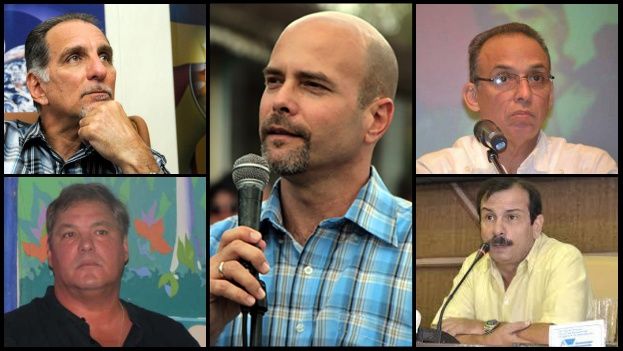
![]() 14ymedio, Havana, 26 January 2018 — The recent publication of the list of deputies to Parliament has begun to generate controversy among the ranks of officialdom. The wife of one of the five Cuban spies who were convicted in the United States has lamented on her Facebook page that three of them have been left out of the National Assembly of People’s Power.
14ymedio, Havana, 26 January 2018 — The recent publication of the list of deputies to Parliament has begun to generate controversy among the ranks of officialdom. The wife of one of the five Cuban spies who were convicted in the United States has lamented on her Facebook page that three of them have been left out of the National Assembly of People’s Power.
Olga Salanueva, wife of the Wasp Network spy René González, expressed her disagreement on the social network because her husband is not included in the list of 605 parliamentarians revealed on Wednesday by the official press.
“I do not see any reason for the five not to be deputies,” complained Salanueva, after discovering that only two of the spies had been included in the list of parliamentarians. “It has been like an explosion of opinions have come to us and I assure you that I have no answer to many of the questions,” she says.
In addition to Gonzalez, Ramón Labañino and Antonio Guerrero were excluded from the National Assembly, while the names of Fernando González and Gerardo Hernández do appear on the list of parliamentarians.
“Three of the five were ignored… Which represents, in my opinion, a new and great injustice against the five heroes,” criticized Salanueva, who believes that González, Labañino and Guerrero “deserve [to be parliamentarians]” because Cuba “needs them too.”
Salanueva’s post on Facebook expressing her displeasure is an unusual event in an electoral process that is characterized by unanimity, conformity and lack of surprises.
Of the 605 parliamentarians that make up the legislature, 50% are elected from among the delegates from the different districts across the country, while the other half are proposed by mass organizations through their candidacy commissions. Included in this share are figures from the spheres of culture, sports and the history of the Revolution.
The five Cuban spies were arrested in 1998 in Florida when they undertook intelligence work for Havana and, after their arrest, the government of former President Fidel Castro deployed an intense and costly propaganda campaign for their release.
For 15 years Cuban officialdom launched a full-scale crusade that included political acts, images of their faces placed in every school, songs, poems, collections of international signatures and a repetitive television advertising campaign for the return of the “Five Heroes.”
René González was released from prison in the United States in 2011 and three years later Fernando González also completed his sentence. Both returned to the Island.
In December 2014, following the diplomatic negotiations between the governments of Raúl Castro and Barack Obama, the three who continued to serve sentences in the US were released and deported to Cuba. In return, the Plaza of the Revolution handed over contractor Alan Gross imprisoned on the island for providing satellite connection devices to Cuba’s Jewish community.
When the released men returned to Cuba on 17 December of that year, they were received immediately by Raul Castro in his office, but Fidel Castro did not meet them until February of 2015, a fact that aroused many suspicions.
Salanueva revealed that her husband, who currently serves as vice president of the José Martí Cultural Society, received some forms to fill out with his details as part of the process to be a possible parliamentarian. After that moment he heard nothing more about the process to reach the National Assembly.
“He was never consulted again, nor called, nor did anyone approach him to ask for his opinion or anything else,” says his wife, who took the opportunity to lament that González’s current job responsibility “has nothing to do with his vocation” and “he can not even exercise the profession he loves.”
After they returned from the United States, each spy was placed in an official institution. Gerardo Hernández works as vice-rector of the Higher Institute of International Relations and Fernando González is president of the Cuban Institute of Friendship with the Peoples. Ramón Labañino, meanwhile, is vice president of the National Association of Economists of Cuba and Antonio Guerrero is vice president of the Superior Organization of Business Management of Design and Construction Engineering.
Salanueva suggests that the decision to exclude three of them from Parliament came from the highest levels of power in Cuba. “I doubt that any candidacy committee has excluded them, because those commissions are made up of good people and I suppose there must be some other reason…”
The Cuban population has a very polarized view of the five men, whom some describe as heroes but others label as “agents” of the Ministry of the Interior or “informers.”
_______________________________
The 14ymedio team is committed to serious journalism that reflects the reality of deep Cuba. Thank you for joining us on this long road. We invite you to continue supporting us, but this time by becoming a member of 14ymedio. Together we can continue to transform journalism in Cuba.
